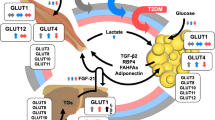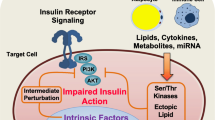Abstract
The kinetic properties of phosphofructokinases (PFKs) from normal human liver, muscle and erythrocytes, and from erythrocytes of two unrelated patients with type VII glycogenosis (muscle PFK deficiency, McKusick 23280) were analysed in this study. Sensitivity to inhibition by ATP and to inhibition by 3-phosphoglycerate, 2-phosphoglycerate, phosphoenolpyruvate and citrate were quite different for muscle and liver PFKs. The kinetic characteristics of normal erythrocyte PFK were intermediate between those of muscle and liver PFKs. The kinetic constants of erythrocyte PFK of a patient in one family were indistinguishable from those in the other family. In addition, kinetic behaviour of residual PFK activity in erythrocytes from patients in the two families were quite similar to those of normal liver PFK. These results of kinetic analyses provide convincing evidence for the concept that normal erythrocyte PFK consists of muscle and liver type subunits. Residual erythrocyte PFK activity in type VII glycogenosis is thus concluded to reflect the activity of liver type PFK existing in patient's erythrocytes.
Similar content being viewed by others
References
Beutler, E., West, C. and Blume, K.-G. The removal of leukocytes and platelets from whole blood.J. Lab. Clin. Med. 88 (1976) 328–333
Hers, H.-G. and van Schaftingen, E. Fructose 2,6-bisphosphate. 2 years after its discovery.Biochem. J. 206 (1982) 1–12
Kahn, A., Meienhofer, M. C., Cottreau, D., Lagrange, J. L. and Dreyfus, J. C. Phosphofructokinase isozyme in man. I. studies of adult human tissues.Hum. Genet. 48 (1979) 93–108
Kono, N. and Uyeda, K. Chiken liver phosphofructokinase I. Crystallization and physicochemical properties.J. Biol. Chem. 248 (1973) 8592–8602
Kono, N., Kuwajima, M. and Tarui, S. Alteration of glycolytic intermediary metabolism in erythrocytes during diabetic ketoacidosis and its recovery phase.Diabetes 30 (1981) 346–353
Koster, J. F., Slee, R. G. and Berkel, T. J. C. V. Enzymes of human phosphofructokinase.Clin. Chim. Acta 103 (1980) 169–173
Layzer, R. B., Rowland, L. P. and Band, W. J. Physical and kinetic properties of human phosphofructokinase from skeletal muscle and erythrocytes.J. Biol. Chem. 244 (1969) 3823–3831
Rose, I. A. and Warms, J. V. B. Glucose- and mannose-1,6-P as activators of phosphofructokinase in red blood cells.Biochem. Biophys. Res. Commun. 59 (1974) 1333–1340
Tarui, S., Okuno, G. Ikura, Y., Tanaka, T., Suda, M. and Nishikawa, M. Phosphofructokinase deficiency in skeletal muscle. A new type of glycogenosis.Biochem. Biophys. Res. Commun. 19 (1965) 517–523
Tarui, S., Kono, N., Nasu, T. and Nishikawa, M. Enzymatic basis of the coexistence of myopathy and hemolytic disease in inherited phosphofructokinase deficiency.Biochem. Biophys. Res. Commun. 34 (1969) 77–82
Tarui, S., Kono, N. and Uyeda, K. Purification and properties of rabbit erythrocyte phosphofructokinase.J. Biol. Chem. 247 (1972) 1138–1145
Tarui, S., Mineo, I., Shimizu, T., Sumi, S., Kuwajima, M. and Kono, N. Muscle and erythrocyte phosphofructokinase deficiency: A metabolic study in one family, a review of the disease and a comparison with McArdle's disease. In Ebashi, S. (ed.)Muscular Dystrophy, University Tokyo Press, Tokyo, 1982, pp. 441–453
Uyeda, K. Phosphofructokinase.Adv. Enzymol. 48 (1979) 193–244
Uyeda, K., Furuya, E. and Luby, L. J. The effect of natural and syntheticd-fructose 2,6-bisphosphate on the regulatory kinetic properties of liver and muscle phosphofructokinases.J. Biol. Chem. 256 (1981) 8394–8399
Vora, S. Isozymes of phosphofructokinase.Isozymes: Curr. Top. Biol. Med. Res. 6 (1982) 119–167
Vora, S., Corash, L., Engel, W. K., Durham, S., Seaman, C. and Piomelli, S. The molecular mechanism of the inherited phosphofructokinase deficiency associated with hemolysis and myopathy.Blood 55 (1980) 629–635
Zannela, A., Mariana, M., Meola, G., Fagnani, G. and Sirchia, G. Phosphofructokinase (PFK) deficiency due to a catalytic inactive mutant M-type subunit.Am. J. Hematol. 12 (1982) 215–225
Author information
Authors and Affiliations
Rights and permissions
About this article
Cite this article
Shimizu, T., Kono, N., Mineo, I. et al. Kinetic properties of erythrocyte phosphofructokinase in patients with type VII glycogenosis from two families — close similarity to liver type phosphofructokinase. J Inherit Metab Dis 7, 107–111 (1984). https://doi.org/10.1007/BF01801765
Received:
Accepted:
Issue Date:
DOI: https://doi.org/10.1007/BF01801765




